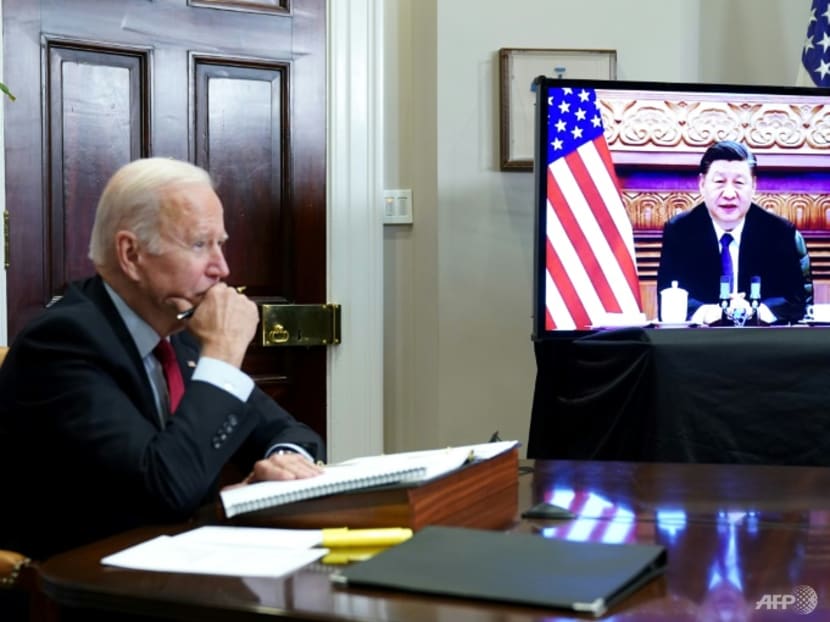Commentary: China dreams of tech domination, thanks to US
The US' campaign against Chinese tech companies has been a wake-up call to China, says an economics professor.

BEIJING: Although the American-born skier Eileen Gu became a darling of the Chinese public during the Beijing Winter Olympics, China trained many of its sports champions at home, through its juguo (whole nation) sports regime.
And now China is applying the juguo approach – deploying massive resources to achieve a strategic objective or build national prestige – to attaining world-class technological prowess.
China is pursuing its technological goals with an intensity unseen since Mao Zedong committed to developing nuclear weapons six decades ago. The motivation could not be clearer.
Under former president Donald Trump, the United States launched a campaign against Chinese tech companies – especially Huawei and ZTE – which included restricting their access to US-controlled critical technologies like semiconductors.
That campaign has continued under President Joe Biden, and many more Chinese firms face a similar fate if they are added to America’s so-called Entity List.
America’s actions have amounted to a wake-up call for China. Rather than remain vulnerable to the whims of the US, it needs to become technologically self-reliant.
Market forces could help here. With companies being forced to procure advanced equipment and technology from domestic sources, demand for Chinese technology is rising. This is likely to accelerate its development.
XI JINPING'S AMBITION OF TECHNOLOGICAL PROWESS
But President Xi Jinping is not leaving China’s technological fate up to the markets. Technological progress is a centrepiece of national policy embedded in the 14th Five-Year Plan. Whereas in the past a government minister would have been responsible for managing this process, Xi is overseeing it directly.
As part of this initiative, the government is showering Chinese tech firms with land, cash and contracts. And it is building an innovation ecosystem modelled after the Manhattan Project and NASA’s Apollo program, with a fully integrated incubation chain linking national labs, universities and high-tech “science parks”.
Related:

China’s government plans to build ten national research labs, each with a different focus – for example, an artificial intelligence lab in Shanghai and a quantum computing lab in Hefei – and supervised directly by a member of the Standing Committee, the Communist Party of China’s top decision-making body.
Moreover, the authorities aim to create 100 new tech centres and 100 additional high-tech industrial parks around the country and have introduced an accelerated process for initial public offerings, delivered through the new Shanghai Stock Exchange Science and Technology Innovation Board (also known as the STAR Market).
Local governments also have a crucial role to play in this process. And, already, many are being innovative about how they support technological development.
Many local governments – such as in Shanghai, Chengdu, Hefei and Chongqing – have embraced fund-of-funds structures and begun securing large stakes in ventures. The Shanghai government collaborated with Tesla, and the Anhui government secured a stake in the Chinese electric-vehicle company Nio.
By encouraging venture capitalists to bring potential “unicorns” to their regions, local governments position themselves to get credit for the resulting GDP growth, job creation and innovation. China has already attracted thousands from around the world to fill research-related positions.
BILLIONS POURING INTO SUBSIDISING INNOVATION
To be sure, over the last two years, China’s central government has taken sweeping action to regulate and rein in tech giants in the name of antitrust, social equity and data protection. But, contrary to popular belief, this campaign does not contradict, let alone undermine, the goal of achieving global technological supremacy.
In the long run, appropriate regulation will pave the way for high-tech companies’ robust growth on a level playing field.
The regulatory clampdown has targeted consumer-facing internet-platform companies, including Alibaba, Didi and JD.com. None operates in the cutting-edge areas – such as biotech, quantum computing, artificial intelligence and semiconductors – where China hopes to catch up to the US.
Curbing their growth will not only boost competition in the sectors where they do operate; it might also free up resources, which could be redirected to the technological frontier.
In any case, the juguo system means that national resources can be mobilised and allocated without tallying the cost. This means the equivalent of billions – maybe trillions – of dollars will go toward subsidising innovation, from supporting basic research to building science parks.
The effort will inevitably waste resources. But China’s leaders are confident that, in the long term, it will pay off.
That kind of thinking is the main advantage of a state-led strategy. Innovation is a highly uncertain process, fraught with risk. Left to their own devices, private firms often prioritise short-term gains over opportunities to invest in innovation and develop core competencies.
China’s government, however, has the tools, patience and determination to bring about long-term transformation, regardless of the short-term costs. The state will pay to cast a wide net in return for a big catch.
CHINA MUST DO MORE FOR REAL TECH BREAKTHROUGHS
This strategy may help China accelerate its mastery of high-tech products, but to make real technological breakthroughs, the country needs a much more open education system.
It also must create an innovation process in which people are motivated both by market rewards and an intrinsic desire to advance knowledge.
China’s old “short, flat, fast” investment strategy, which has worked for sports and infrastructure, must give way to a new playbook for technology, adopted by a patient country with patient people and patient capital.
One thing is clear: Given the Chinese response to US pressure on its tech giants, it is safe to assume that further restrictions will only strengthen China’s determination to achieve technological self-sufficiency – and, eventually, global primacy. This should provide the Biden administration with some food for thought as it considers its next steps.
Keyu Jin is a Professor of Economics at the London School of Economics and Political Science. She is also a World Economic Forum Young Global Leader. PROJECT SYNDICATE



